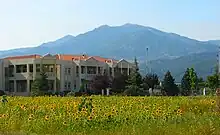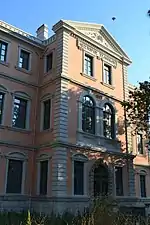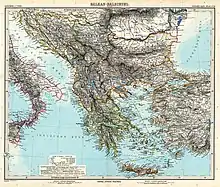Δημοκρίτειο Πανεπιστήμιο Θράκης | |
 | |
| Type | Public Greece University System Higher Education Institution |
|---|---|
| Established | 1974 |
| Students | 28,000 |
| Location | |
| Website | https://duth.gr/ |
The Democritus University of Thrace (DUTH; Greek: Δημοκρίτειο Πανεπιστήμιο Θράκης), established in July 1973, is based in Komotini, Greece and has campuses in the Thracian cities of Xanthi, Komotini, Alexandroupoli and Orestiada.[1][2]
The university today comprises eight schools — School of Humanities, Engineering School, Law School, School of Agricultural Sciences, School of Education Sciences, School of Economic and Social Sciences, School of Health Sciences and School of Physical Education and Sport Sciences and twenty Departments.[3]
As of 2020, there is a student population of 25,919 registered undergraduates and 5,071 registered postgraduate and PhD students, a research and teaching personnel of over 600 as well as approximately 300 administrative staff.[4] As a university it is state-owned and fully self-administered. It is thus supervised and subsidized by the Greek State and the Ministry of Education and Religious Affairs. The university plays an important role in strengthening the national and cultural identity of the region of Thrace, and contributes to the high level of education in Greece.
Name and emblem

The emblem of the Democritus University of Thrace represents the influential Ancient Greek pre-Socratic philosopher Democritus. He was born in Abdera, Thrace and is primarily remembered today for his formulation of an atomic theory of matter.
History
The university was established in July 1973 and accepted its first students in the academic year 1974–1975. The first departments to operate were the Department of Law and the Department of Civil Engineering. It was named after Democritus, the ancient Greek philosopher who hailed from the town of Abdera in Thrace.[5]


Schools and departments
The university consists of eight schools and 20 departments.[6]
| Schools | Departments |
|---|---|
| School of Engineering [7]
(Xanthi) |
|
| School of Classics and Humanities
(Komotini) |
|
| School of Law
(Komotini) |
|
| School of Physical Education and Sport Sciences
(Komotini) |
|
| School of Economic, Political and Social Sciences
(Komotini) |
|
| School of Health Sciences |
|
| School of Education |
|
| School of Agriculture and Forestry |
|
Research
The research strategy of DUTH aims at one hand to further support its academic and outward-looking character and on the other hand to promote its social role.[24]
Academic evaluation
In 2016 the external evaluation committee gave Democritus University of Thrace a Positive evaluation.[1][2]
An external evaluation of all academic departments in Greek universities was conducted by the Hellenic Quality Assurance and Accreditation Agency (HQA).[25][26]
See also
- Aristotle University of Thessaloniki, founded in 1925, it is the largest university in Macedonia, Greece.
- List of universities in Greece
- List of research institutes in Greece
- European Higher Education Area
- Balkan Universities Network
- Outline of academic disciplines
- Education in Greece
References
- 1 2 "Democritus University of Thrace – External Evaluation Report" (PDF). 2015."The relation between DUTH and the wider society seems to be rather asymmetric. In addition, it appears that some of the existing problems are due to the multi-city / multi-campus nature of DUTH and therefore the institution should focus on overcoming difficulties regarding connection of departments and schools with the whole region and not only within the city in which the local campus belongs. Although the intent is that the academic programs and awarded degrees are monitored there is no evidence of this objective being achieved. Library resources and operation are negatively affected by limited funding. Transportation and student housing issues need to be addressed. A center for faculty support of teaching and research/grants development is in order. The report was honest and clear in pointing out strengths as well as weaknesses. One dissenting member who finds the final rating as “Worthy of Merit” views it as a rating of “the totality of the internal evaluation process” with emphasis on the overall efficacy."
- 1 2 "World University Rankings". Times Higher Education (THE). 2018-09-26. Retrieved 2018-09-29.
- ↑ "DUTH – Presentation of External Evaluation" (in Greek). DUTH.
- ↑ "DUTH Main page statistics" (in Greek). DUTH. 2020.
- ↑ "History – Democritus University of Thrace". DUTH. 2017. Archived from the original on 2018-01-13. Retrieved 2018-01-15.
- ↑ "DUTH Schools and Departments". DUTH. Archived from the original on 2017-12-23.
- ↑ "DUTH, School of Engineering". Democritus University of Thrace.
- ↑ "Department of Civil Engineering – HQA Final Report" (PDF). 2013.
- ↑ "Department of Electrical and Computer Engineering – HQA Final Report" (PDF). 2013.
- ↑ "Department of Environmental Engineering – HQA Final Report" (PDF). 2008.
- ↑ "Department of Architecture – HQA Final Report" (PDF). 2013.
- ↑ "Department of Production Engineering – HQA Final Report" (PDF). 2013.
- ↑ "Department of History and Ethnology – HQA Final Report" (PDF). 2014.
- ↑ "Department of Greek Philology – HQA Final Report" (PDF). 2014.
- ↑ "Department of Languages, Literature and Culture of the Black Sea Countries – HQA Final Report" (PDF). 2014.
- ↑ "Department of Law – HQA Final Report" (PDF). 2014.
- ↑ "Department of Physical Education – HQA Final Report" (PDF). 2010.
- ↑ "Department of Medicine – HQA Final Report" (PDF). 2011.
- ↑ "Department of Molecular Biology and Genetics – HQA Final Report" (PDF). 2011.
- ↑ "Department of Primary Education – HQA Final Report" (PDF). 2011.
- ↑ "Department of Preschool Education – HQA Final Report" (PDF). 2013.
- ↑ "Department of Agricultural Development – HQA Final Report" (PDF). 2014.
- ↑ "Department of Forestry and Management of the Environment – HQA Final Report" (PDF). 2011.
- ↑ "DUTH – Research Strategy" (in Greek). DUTH. 2015.
- ↑ "Hellenic Quality Assurance and Accreditation Agency – External evaluation reports of Institutions". www.adip.gr. 2016.
- ↑ "Hellenic Quality Assurance and Accreditation Agency – External evaluation reports of Departments". www.adip.gr. 2014.
External links
- Democritus University of Thrace (in Greek and English)
- DUTH Internal Quality Assurance Unit (in Greek)
- DUTH DASTA Office (Career Office & Innovation Unit) (in Greek)
- DUTH Information Technology and Communications Office (in Greek)
- Hellenic Authority for Higher Education (HAHE) (in Greek and English)
- Study in Greece – Official portal for studies in Greece (in Greek and English)
- "ATHENA" Plan for Higher Education (in Greek)
- Hellenic Academic Libraries Link (HEAL-Link)) (in Greek and English)
- Kallipos (e-books Greek academic publishing) (in Greek and English)
- Greek Research and Technology Network (GRNET) (in Greek and English)
- okeanos (GRNET's cloud service) (in Greek and English)
